日语专四2008年
英语专业四八级日语专业四级任课老师奖励办法

英语专业四八级、日语专业四级任课老师奖励办法(2009-2010年)为了鼓励教师,调动教师积极性,促进教学,根据分院综合工作量补贴分配意见,从2009-2010学年的综合工作量补贴中提取160分,对英语、日语专业在08级专四、专八考试中成绩突出的教师进行奖励。
具体办法如下:1.分类根据各自情形,分为3类,分别计算:第一类:英语专业四级,7个班第二类:日语专业四级,2个班第三类:英语专业八级,6个班2. 分配方案1)奖励构成根据专业实际情况,奖项由“管理奖+基础奖+等级奖”构成。
管理奖:面向统筹考试相关事务的老师(含资料准备、人员安排、模考组织等),每人3分。
(合计9分)基础奖:面向所有参加等级考试辅导老师,奖励额度为周学时*0.5分。
合计106课时(53分)。
等级奖:专四、专八的奖励面为各专业总班级数的50%,再根据通过率设一、二、三等奖。
奖励额度,一等奖20分/班,二等奖15分/班,三等奖10分/班,按课时分配。
2)等级奖获奖条件英语专四:一等奖,通过率90%及以上,二等奖85%以上,三等奖75%以上。
日语专四:一等奖,通过率75%及以上,二等奖70%以上,三等奖65%以上。
英语专八:一等奖,通过率55%及以上,二等奖50%以上,三等奖45%以上。
3)特别说明A. 若有多个班级同时达到条件,则按从高往低确定获奖班级。
若没有班级达到条件,空缺。
B. 非在编老师或已调离学校的老师不评奖;培训期间发生严重或重大教学事故者不评奖;发生一般教学事故或群体投诉,奖励额度减半。
3)分配班级约3分。
外国语分院2011年6月9日。
日语专四单词

遮るさえぎる他遮、遮挡。
拦截、阻拦濡らすぬらす他弄湿遡るさかのぼる自朔流。
回朔、追朔ぬる他涂、抹裂くさく他裂开濡れるぬれる自湿ささげる他捧。
擎。
献给。
贡献願うねがう他请求、愿望、期望ささやく自耳语、私语、嘀咕寝転ぶねころぶ自横卧、随便躺下さっする他推测、判断、想象捻るねじる他五扭、拧、捻錆びるさびる自锈、生锈粘るねばる自发粘。
坚持、坚忍不拔他怠工、偷懒ねらう他瞄准。
窥视、伺机。
图谋さます他弄凉、冷却逃れるのがれる自逃跑、逃脱、摆脱、逃难、回避、躲避さます他臨むのぞむ他面临、面对。
出席、光临妨げるさまたげる他妨碍、阻止、阻挠のべる他叙述、说明浚うさらう他疏浚、疏通のりこえる自超越、度过、克服。
超过、超出さわぐ自吵闹、吵嚷。
骚乱、闹事。
轰动のりこす他坐过站。
超越、超过。
度过しのぶ自他忍耐。
克服、摆脱。
凌驾、超出生えるはえる自生、长しのぶ他追思、缅怀、怀念剥がすはがす他剥下、揭下しばる他绑、捆、扎。
束缚。
限制。
はかる他谋求。
图谋痺れるしびれる自麻木、发氧はずれる自脱落、掉下。
脱离、落空、不中仕舞うしまう他完了、终了。
搞完、做完收拾、收起来発するはっする自他出发。
发生、开始、发源。
发(声、光)。
发表しみる自渗入、渗透。
刺痛離すはなす他拉开、隔开嵌めるはめる自正合适、吻合、正好嵌入しゃがむ自蹲下ばら撒くばらまく他(稀稀拉拉地)撒、散布。
到处花钱しゃれる自(穿戴打扮)漂亮、潇洒腫れるはれる自肿熟すじゅくす自(植物果实)熟、成熟。
(时机)成熟。
纯熟。
熟练冷えるひえる自变冷、变凉。
觉得冷、觉得凉据えるすえる他安排、放。
沉静下来。
稳定下来。
引き伸ばすひきのばす他拖长、拖延。
放大(照片)透かすすかす他留出空隙。
透过…(看)潜むひそむ自隐藏。
潜藏、蕴藏好くすく他喜欢、爱好浸すひたす他浸、泡。
浸湿掬うすくう他捞、捧、舀、撇ひっかかる自挂住、卡住。
牵连。
受骗]すくう他救、拯救、挽救ひっかける挂上、挂起来。
披上。
撞上。
欺骗、勾引。
日语专四作文
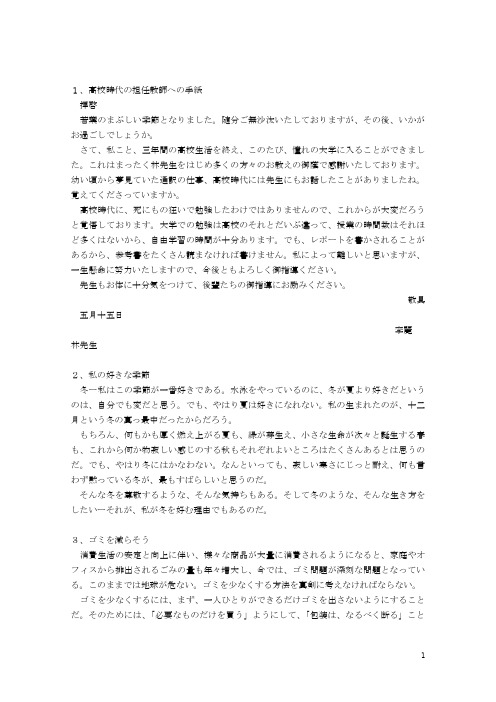
1、高校時代の担任教師への手紙拝啓若葉のまぶしい季節となりました。
随分ご無沙汰いたしておりますが、その後、いかがお過ごしでしょうか。
さて、私こと、三年間の高校生活を終え、このたび、憧れの大学に入ることができました。
これはまったく林先生をはじめ多くの方々のお教えの御蔭で感謝いたしております。
幼い頃から夢見ていた通訳の仕事、高校時代には先生にもお話したことがありましたね。
覚えてくださっていますか。
高校時代に、死にもの狂いで勉強したわけではありませんので、これからが大変だろうと覚悟しております。
大学での勉強は高校のそれとだいぶ違って、授業の時間数はそれほど多くはないから、自由学習の時間が十分あります。
でも、レポートを書かされることがあるから、参考書をたくさん読まなければ書けません。
私によって難しいと思いますが、一生懸命に努力いたしますので、今後ともよろしく御指導ください。
先生もお体に十分気をつけて、後輩たちの御指導にお励みください。
敬具五月十五日李麗林先生2、私の好きな季節冬ー私はこの季節が一番好きである。
水泳をやっているのに、冬が夏より好きだというのは、自分でも変だと思う。
でも、やはり夏は好きになれない。
私の生まれたのが、十二月という冬の真っ最中だったからだろう。
もちろん、何もかも厚く燃え上がる夏も、緑が芽生え、小さな生命が次々と誕生する春も、これから何か物寂しい感じのする秋もそれぞれよいところはたくさんあるとは思うのだ。
でも、やはり冬にはかなわない。
なんといっても、寂しい寒さにじっと耐え、何も言わず黙っている冬が、最もすばらしいと思うのだ。
そんな冬を尊敬するような、そんな気持ちもある。
そして冬のような、そんな生き方をしたいーそれが、私が冬を好む理由でもあるのだ。
3、ゴミを減らそう消費生活の安定と向上に伴い、様々な商品が大量に消費されるようになると、家庭やオフィスから排出されるごみの量も年々増大し、今では、ゴミ問題が深刻な問題となっている。
日语能力考试说明日语专四专八考试说明及推荐用书

日语能力考试说明日语专四专八考试说明及推荐用书日语能力考试日本语能力测试(英语:Japanese Language Proficiency Test,简称JLPT),是检定母语非日语者的日语能力考试。
考试自1984年起一年一度在世界各地举办,在世界20多个国家和地区开考,是首份世界统一的日语能力考试。
在日本国内,本考试由日本国际教育支援协会举办;国外则由日本国际交流基金举办。
考试试卷由日本发往全球各地,考完后再全部送回日本统一阅卷,3月前后再将成绩发回各地考点。
所以考试是全球性的,取得的合格证书也是全球通用的。
2003年文部科学省创立日本留学试验之前,本考试用于检定日本大学留学生的日语语文能力。
考试变化近年来,参加日本语能力测试的考生范围不断扩大,考试目的也不断增多,除了测试日语水平外,增加了出国、就业、升级、提职等等。
2009年,世界上共有54个国家和地区的176个城市(除日本国内之外)举办此项考试,中国在37个城市设有70个考点,全世界报名测试的人数达90万人。
该考试从2009年开始每年举办2次,于7月和12月的第一个星期日实施(报名时间请考生留意报名网站,7月报名时间一般在3-4月公布,12月则在9月期间)。
2009年,日本国际交流基金会与日本国际教育支援协会对日本语能力测试的内容进行了改版,决定自2010年开始实施新的日本语能力测试。
新考试将目前的四个等级(1级、2级、3级、4级)改变为五个等级(N1、N2、N3、N4、N5)N代表Nihongo(日本语)New双重含义。
变化最大的地方是在以往的2级和3级之间新增加了N3这一级别。
用途及时效(1)目前大多数日本大学招收外国留学生时,要求留学生提交该考试的一级证书做为录取他们的语言水平依据。
(2)日本专科院校要求注册的留学生能提交一级或二级的证书。
(3)日本方面对有关国际交流或某些劳务输入者要求提交相应的等级证书。
(4)国内有些日资企业要求其求职者提交相应的等级证书。
日语专四真题
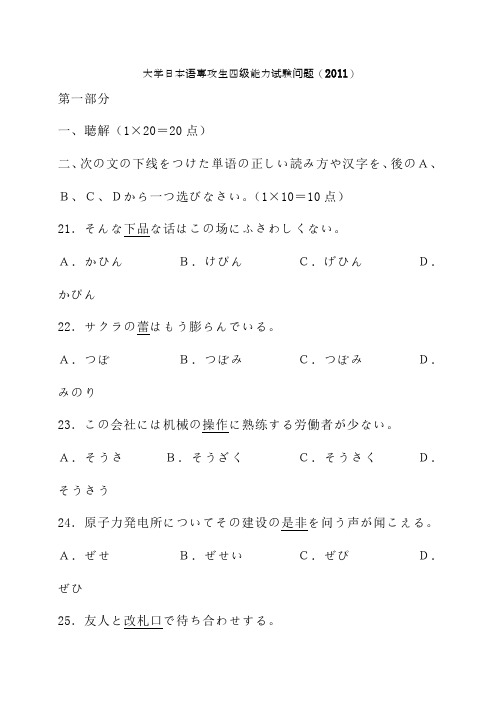
大学日本语専攻生四级能力试験问题(2011)第一部分一、聴解(1×20=20点)二、次の文の下线をつけた単语の正しい読み方や汉字を、後のA、B、C、Dから一つ选びなさい。
(1×10=10点)21.そんな下品な话はこの场にふさわしくない。
A.かひんB.けぴんC.げひんD.かぴん22.サクラの蕾はもう膨らんでいる。
A.つぼB.つぼみC.つぽみD.みのり23.この会社には机械の操作に熟练する労働者が少ない。
A.そうさB.そうざくC.そうさくD.そうさう24.原子力発电所についてその建设の是非を问う声が闻こえる。
A.ぜせB.ぜせいC.ぜぴD.ぜひ25.友人と改札口で待ち合わせする。
A.かいさつぐちB.かいさつくちC.かいさつごうD.かいさつこう26.このクラスの生徒たちはよく教室でさわぐんだよ。
A.閙B.唤C.扰D.騒27.このごろ、ふところに金が一銭もなく、困っている。
A.袖B.懐C.包D.财布28.あの子はしつけが悪い。
A.师付B.执化C.叱D.躾29.岛民の大半は空港建设賛成にかたむきつつある。
A.偏B.颇C.倾D.斜30.今度の事件は彼のしゅっせの妨げになるだろう。
A.出生B.终世C.出世D.终生三、次の文のに入れるのに最も适当な言叶を後のA、B、C、Dから一つ选びなさい。
(1×15=15点)31.どんな仕事でも一人前になるためには努力が必要だ。
A.かえざるB.さかえざるC.たえざるD.はえざる32.各々の持ち味をように工夫する必要があります。
A.まかすB.はなすC.ならすD.いかす33.こんな问题はもなく解决できる。
A.わけB.はずC.ものD.こと34.申告された件数はほんの一割程度にすぎない。
A.またB.まだC.もうD.そう35.今度の会见をに、両国関系は新たな局面を迎えた。
A.きっかけB.じつげんC.じっさいD.ひっかけ36.理由もなく急にそうなるさまを、日本语では「」という。
2008年全国硕士研究生入学统一考试日语试题(带答案)

08年全国硕士研究生入学考试日语试题200820Ⅰ基礎知識(20点)次の文章を読んで、1~20の問に答えなさい。
答えは選択肢[A][][B B][][C C][][D D]からもっとも適切なものを一つ選びなさい。
人と物の関係を端的に示す例がある。
ある外国人女子学生が日本の農村社会での人間関係、行動、習慣を観察すること(1)目的に、長野県の民家に同居し、調査活動をしていた。
その家の大家さんは親切な人で、いろいろと面倒を見て(2)。
私は、その学生に日本語を教授する仕事を引き受けていたが、ある日彼女は(3)ことを言い出した。
「おととい、大家さんと喧嘩をして、大家さんはそれから一言も口をきいてくれなくなった。
一体どうしてでしょうか」というのである。
事情を詳しく尋ねてみると、(4)、おととい大家さんから借りていたストーブが(14)何かの加減で故障してしまったので、持って行き、壊れましたと(15)渡した途端、大家さんは不(19)機嫌になってしまった、というのである。
私はそのとき、実際にどんな言葉遣いをしたのかを確かめてみた。
返答は「この前から借りていたストーブが壊れてしまいました」である。
私は、大家さんの(20)人柄や普段の言語行動についても尋ねてみた。
親切だが、(5)世話やきの感じのするタイプであるらしい。
そこで私はそのストーブの故障の原因について尋ねてみた。
(6)その女子学生は、「理由はよく分からないが、その朝、火をつけようとするとつかなくなっていたんです。
だから壊れましたと言いました」と言うのである。
次に私は、「壊れました」と「壊しました」の表現法の違いについて本人に尋ね、そのことで話しあう(7)。
「壊れました」と「壊しました」は、文法的に言えば、他動詞表現と自動詞表現の差に過ぎない。
しかし、そこでコミュニケーション上問題になるのは、実は、どちらを選択するかということが、物と人との関係の中で、相手に対する自分の態度を明確に表してしまう(8)。
2008专四真题
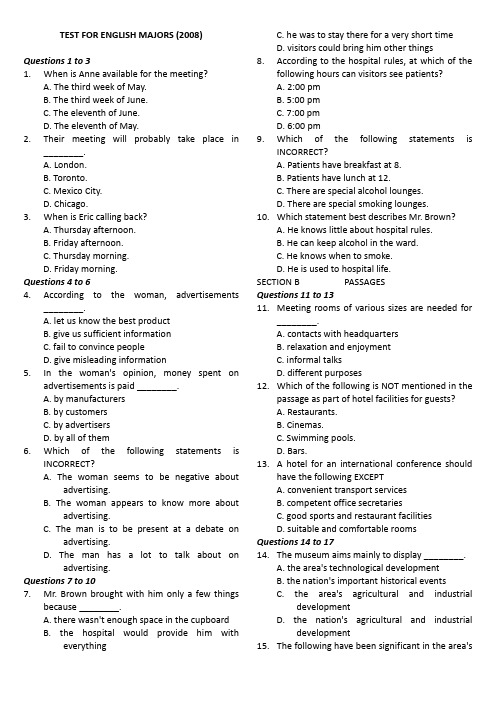
TEST FOR ENGLISH MAJORS (2008) Questions 1 to 31. When is Anne available for the meeting?A. The third week of May.B. The third week of June.C. The eleventh of June.D. The eleventh of May.2. Their meeting will probably take place in________.A. London.B. Toronto.C. Mexico City.D. Chicago.3. When is Eric calling back?A. Thursday afternoon.B. Friday afternoon.C. Thursday morning.D. Friday morning.Questions 4 to 64. According to the woman, advertisements________.A. let us know the best productB. give us sufficient informationC. fail to convince peopleD. give misleading information5. In the woman's opinion, money spent onadvertisements is paid ________.A. by manufacturersB. by customersC. by advertisersD. by all of them6. Which of the following statements isINCORRECT?A. The woman seems to be negative aboutadvertising.B. The woman appears to know more aboutadvertising.C. The man is to be present at a debate onadvertising.D. The man has a lot to talk about onadvertising.Questions 7 to 107. Mr. Brown brought with him only a few thingsbecause ________.A. there wasn't enough space in the cupboardB. the hospital would provide him witheverythingC. he was to stay there for a very short timeD. visitors could bring him other things8. According to the hospital rules, at which of thefollowing hours can visitors see patients?A. 2:00 pmB. 5:00 pmC. 7:00 pmD. 6:00 pm9. Which of the following statements isINCORRECT?A. Patients have breakfast at 8.B. Patients have lunch at 12.C. There are special alcohol lounges.D. There are special smoking lounges.10. Which statement best describes Mr. Brown?A. He knows little about hospital rules.B. He can keep alcohol in the ward.C. He knows when to smoke.D. He is used to hospital life.SECTION B PASSAGESQuestions 11 to 1311. Meeting rooms of various sizes are needed for________.A. contacts with headquartersB. relaxation and enjoymentC. informal talksD. different purposes12. Which of the following is NOT mentioned in thepassage as part of hotel facilities for guests?A. Restaurants.B. Cinemas.C. Swimming pools.D. Bars.13. A hotel for an international conference shouldhave the following EXCEPTA. convenient transport servicesB. competent office secretariesC. good sports and restaurant facilitiesD. suitable and comfortable rooms Questions 14 to 1714. The museum aims mainly to display ________.A. the area's technological developmentB. the nation's important historical eventsC. the area's agricultural and industrialdevelopmentD. the nation's agricultural and industrialdevelopment15. The following have been significant in the area'sprosperity EXCEPTA. the motorwaysB. the Roman roadC. the canalsD. the railways16. We know from the passage that some exhibits________.A. are borrowed from workshopsB. are specially made for displayC. reflect the local culture and customsD. try to reproduce the scene at that time17. The passage probably comes from ________.A. a conversation on the museumB. a museum tour guideC. a museum bookletD. a museum advertisementQuestions 18 to 2018. According to the speaker, safety in dormitorymeans that you ________.A. insure all your expensive thingsB. lock doors when going outC. lock windows at nightD. take all necessary precautions19. What does the speaker suggest girls do whenthey are going to be out late?A. Call their friends.B. Stay with their friends.C. Avoid walking in streets.D. Always take a taxi.20. What is the speaker's last advice?A. To take a few self-defense classes.B. To stick to well-lit streets at night.C. To avoid walking alone at night.D. To stay with their friends.SECTION C NEWS BROADCAST Questions 21 and 2221. What happened during the New Yearcelebration in Thailand?A. Terrorists fought with Government troops.B. Thai troops killed terrorists.C. There were shootings.D. There were explosions.22. What has led to the violent situation in thesouth of Thailand?A. The Muslims wanted independence.B. Thai troops have been sent there.C. About 2000 people have been killed.D. There have been more bombings since 2004. Questions 23 and 2423. Under the national oil law, the Iraqi government________.A. will give more oil revenues to only a fewprovincesB. will let provinces distribute their oil revenuesC. will distribute oil revenues according topopulation sizeD. will distribute oil revenues according tosecurity needs24. The construction package is meant to________.A. help build more housesB. help improve the country's economyC. help more children to go to schoolD. help more young people to get education Questions 25 and 2625. The joint committee will promote co-operationbetween Egypt and Spain in all the following areas EXCEPTA. educationB. industryC. investmentD. technology26. What is this news item mainly about?A. The establishment of a joint committee.B. The trade relations between Egypt and Spain.C. The future trade volume between Egypt andSpain.D. The establishment of a joint business council. Question 2727. According to the news, Japanese teenagewomen ________.A. are less violent than menB. are less violent than beforeC. are more violent than beforeD. are more violent than menQuestion 2828. Which of the following statements is CORRECTaccording to the news?A. Zimbabweans stayed away from voting.B. Zimbabweans were enthusiastic aboutvoting.C. Only a few Zimbabweans turned up to vote.D. Zimbabweans believed that Mugabe wouldwin.Questions 29 and 3029. The news mentioned ________ reason (s) forthe action taken by Indian telecom workers.A. 1B. 2C. 3D. 430. According to the news, who among thefollowing were NOT affected by telecom workers' action?A. Banks.B. Big companies.C. Long-distance callers.D. Government officials.PART III CLOZE (15 MIN)Salt, shells or metals are still used as money in out-of-the-way parts of the world today.Salt may seem rather a strange 31to use as money, 32in countries where the food of the people is mainly vegetable, it is often an 33necessity. Cakes of salt, stamped to show their 34, were used as money in some countries until recent 35, and cakes of salt 36buy goods in Borneo and parts of Africa.Sea shells 37as money at some time 38another over the greater part of the Old World. These were 39mainly from the beaches of the Maldives Islands in the Indian Ocean, and were traded to India and China. In Africa, shells were traded right across the 40from East to West.Metal, valued by weight, 41coins in many parts of the world. Iron, in lumps, bars or rings, is still used in many countries 42paper money. It can either be exchanged 43goods, or made into tools, weapons, or ornaments. The early money of China, apart from shells, was of bronze, 44in flat, round pieces with a hole in the middle, called "cash". The 45of these are between three thousand and four thousand years old-older than the earliest coins of the eastern Mediterranean.Nowadays, coins and notes have 46 nearly all the more picturesque 47of money, and 48in one or two of the more remote countries people still keep it for future use on ceremonial 49such as weddings and funerals, examples of 50money will soon be found only in museums.31. A. object B. article C. substance D.category32. A. butB. andC. soD. even33. A. abstractB. advantageousC. abundantD. absolute34. A. weightB. valueC. roleD. size35. A. timesB. eventsC. situationsD. conditions36. A. evenB. alsoC. stillD. never37. A. had been usedB. are usedC. would be usedD. would have been used38. A. andB. butC. yetD. or39. A. collectedB. producedC. grownD. raised40. A. cityB. districtC. communibD. continent41. A. processedB. producedC. precededD. proceeded42. A. in spite ofB. instead ofC. along withD. in line with43. A. againstB. asC. inD. for44. A. oftenB. seldomC. reallyD. much45. A. earlierB. earliestC. betterD. best46. A. replacedB. reproducedC. reflectedD. recovered47. A. sizesB. shapesC. formatsD. forms48. A. whileB. althoughC. becauseD. if49. A. eventsB. gatheringsC. occasionsD. assemblies50. A. originalB. primitiveC. historicalD. crudePART IV GRAMMAR&VOCABULARY (15 MIN) 51. Our association, which has consistently pressedfor greater employment opportunities for the disabled, will publish ________ proposals in the near future.A. theirB. ourC. hisD. its52. Had Judy been more careful on the maths exam,she ________ much better results now.A. would be gettingB. could have gotC. must getD. would get53. Nine is to three ________ three is to one.A. whenB. thatC. whichD. what54. Men differ from animals ________ they canthink and speak.A. for whichB. for thatC. in thatD. in which55. ________ he wanted to go out with his friendsat the weekend, he had to stay behind to finish his assignment.A. Much thoughB. Much asC. As muchD. Though much56. I enjoyed myself so much ________ I visited myfriends in Paris last year.A. whenB. whichC. thatD. where57. Which of the following is INCORRECT?A. All his lectures were boring.C. Her few friends are all fond of dancing.B. Half his money was gone.D. He invited many his friends to the party.58. When you have finished with that book, don'tforget to put it back on my desk, ________?A. do youB. don't youC. will youD. won't you59. What does "He wisely refused to spend hismoney" mean?A. It was wise of him to refuse to spend hismoney.B. He refused to spend his money in a wisemanner.C. He was short of money and didn't want tobuy anything.D. He refused, in a wise manner, to spend hismoney.60. They stood chatting together as easily andnaturally as ________.A. it could beB. could beC. it wasD. was61. The following are all correct responses to "Whotold the news to the teacher?" EXCEPTA. Jim did this.B. Jim did so.C. Jim did that.D. Jim did.62. Quality is ________ counts most.A. whichB. thatC. whatD. where63. In his plays Shakespeare ________ hischaracters live through their language.A. would makeB. had madeC. madeD. makes64. The square itself is five hundred yards wide, fivetimes ________ the size of St. Peter's in ________.Rome.A. /B. that ofC. which isD. of65. Which of the following sentences expresses"probability"?A. You must leave immediately.B. You must be feeling rather tired.C. You must be here by eight o'clock.D. You must complete the reading assignmenton time.66. When he first started in university, he really feltat ________ with his major – economics.A. shoreB. bankC. oceanD. sea67. On the road motorists should be aware ofcyclists and be ________ towards them.A. considerableB. consideringC. considerateD. considered68. Sally was a bit shy, but the teacher found herquite ________ discussing a recent film with others.A. at homeB. at mostC. at houseD. at bean69. The company has capitalized ________ theerror of judgment made by its business competitor.A. inB. overC. withD. on70. Tim has failed three courses this semester, sohe will have to ________ them next semester.A. remakeB. repeatC. reapplyD. revise71. Keep this reference book; it may come in________ one day.A. handyB. usefulC. convenientD. helpful72. The questions that the speaker raised were well________ the average adult.A. pastB. onC. beyondD. through73. Teachers in this school were encouraged to usedrama as a (n) ________ of learning.A. designB. instrumentC. agencyD. tool74. First, we need to find out what his scheme is,and then act ________.A. sensitivelyB. imaginativelyC. efficientlyD. accordingly75. At first Jim was not quite clear what he wasgoing to do after university, but now he seems ________ on becoming a computer programmer.A. fitB. setC. disposedD. decided76. When invited to talk about his achievements+he refused to blow his own ________ and declined to speak at the meeting.A. trumpetB. whistleC. bugleD. flute77. In spite of the treatment, the pain in his leggrew in ________.A. gravityB. extentC. intensityD. amount78. Bus services between Town Centre and NewtonHousing Estate will be ________ until the motorway is repaired.A. discontinuedB. suspendedC. haltedD. ceased79. The moon, being much nearer to the Earth thanthe Sun, is the ________ cause of the tides.A. principalB. basicC. initialD. elementary80. Teddy came to my ________ with a cheque of$200 to pay my room rate, after I phoned him that my wallet had been stolen.A. attendanceB. assistanceC. rescueD. safetyPART V READING COMPREHENSION (25 MIN) TEXT AWhen the sun is up in Amsterdam, the largest city in the Netherlands sits quietly on the Amstel River. You can rent a bicycle, visit the Van Gogh or Anne Frank museum, or take a water taxi.But when the sun goes down, the partying begins. In the big clubs and in coffee shops, tourists gather to hang out, talk politics and smoke.Several areas of the city clearly show the two worlds that rule Amsterdam. And they're all within a short cab ride of each other.For example, Dam Square attracts daytime sightseers to its festivals, open markets, concerts and other events. Several beautiful and very popular hotels can be found there. And there is theRoyal Palace and the Magna Plaza shopping mall.But as evening descends on Dam Square so do the party-seekers. Hip pop or funk music begins blaring from Club Paradiso and Club Melkweg. These are two of the most popular clubs inEurope. So if you come, be ready to dance. The clubs don't shut down until 4 am.And while you are there, check out the various inexpensive ways to tour the city. Don't worry about getting lost. Although Dutch is the official language, most people in Amsterdam speak English and are happy to help you with directions.And you'll notice that half the people in the streets are on bicycles. They rent for US$17 to $20 for a whole day.Amsterdam also has a good canal system. From anywhere between U852 and $9.50, you can use the canal bus or a water taxi to cruise the "Venice of the North".You can take in the picturesque canal house architecture: The rows of neat, narrow four-story dwellings of brownstone with large windows are well worth seeing. Many of them are several centuries old.You might also want to jump out of the canal bus at the Museum Quarter and start walking.Masterpieces by Dutch artists such asRembrandt, Bruegel, Van Gogh and others are on display at the Van Gogh Museum, Rembrandt House and others.The city has an appreciation of its historic past. One place to visit is the Anne Frank House in Nine Streets. It was there that the young Jewish girl wrote her famous diary during World War II. Visitors can view Anne's original diary and climb behind the bookcase to the room where she and her family hid from the Nazis for two years.81. At the beginning of the passage, the authorindicates that ________.A. Amsterdam is generally known as a quiet city.B. parties go on all day long in Amsterdam,C. Amsterdam presents two different pictures.D. Amsterdam attracts many daytime visitors.82. Which tourist attraction is cited for elaborationin Paragraphs Four and Five?A. Royal Palace.B. Dam Square.C. Club Paradiso.D. Magna Plaza.83. According to the passage, the local people haveall the following characteristics EXCEPTA. they are party goersB. they show hospitalityC. they can speak EnglishD. they are fond of cycling84. Which of the following adjectives can bestdescribe Amsterdam as a tourist city?A. Modern.B. Delightful.C. Quiet.D. Historic.TEXT BIn an article some Chinese scholars are described as being "tantalized by the mysterious dragon bone hieroglyphics." Tantalized is one of many English words that have their origins in myths and legends of the past (in this case, Greek and Roman ones). The meaning of the verb tantalize is a very particular one: "to promise or show something desirable to a person and then take it away; to tease by arousing hope." Many (but not all) English dictionaries give you a brief indication of a word's origins in brackets before or after the explanation of the meaning. For tantalize the following explanation is given: [> Tantalus]. This means that you should look up the name Tantalus to find out the word's origins, and if you do, you will find out that in Greek mythology, Tantalus was a king who was punished in the lower world with eternal hunger and thirst; he was put up to his chin in water that always moved away when he tried to drink it and with fruit on branches above him placed just a little bit out of his reach. Can you see why his name was changed into a verb meaning "to tease or torment by arousing desire"?Another example is the word siren, familiar to us as the mechanical device that makes such an alarming sound when police cars, ambulances, or fire engines approach. This word also has its origins in Greek mythology. The traveler Odysseus (Ulysses to the Romans) made his men plug their ears so that they wouldn't hear the dangerous voices of the sirens, creatures who were half bird and half woman and who lured sailors to their deaths on sharp rocks. So the word came to be associated both with a loud sound and with danger!When someone speaks of a "jovial mood" or a "Herculean effort," he or she is using words with origins in mythology. Look these words up to find their meaning and relationship to myths.Many common words, such as the names for the days of the week and the months of the year, also come from mythology. Wednesday derives from the ancient Norse king of the gods, Woden, and Thursday was originally Thor's day, in honour of Thor, the god of thunder. As a matter of fact, all the planets, except the one we live on, bear names that come from Roman mythology, including the planet that is farthest away from the sun and for that reason was called after the Roman god of the dead. This god has also given his name to one of the chemical elements.Several other elements have names that come from mythology, too.It seems that myths and legends live on in the English language.85. The purpose of the first sentence in ParagraphOne is ________.A. to describe the work of some ChinesescholarsB. to arouse readers' interest in hieroglyphicsC. to lead readers onto the main themeD. to link the preceding part to the present one86. We learn from the passage, all Englishdictionaries include ________.A. legendsB. mythologyC. word originsD. word definitions87. The example of tantalize is to show ________.A. how the word came into existenceB. how Tantalus was punished in the lowerworldC. how all English dictionaries show wordoriginsD. how the meaning of the word changed overthe years88. According to the passage, which of thefollowing does NOT have origins in myths or legends?A. Jovial.B. Wednesday.C. Earth.D. March.89. Which of the following can best serve as thetitle of the passage?A. Greek and Roman Mythology in Language.B. Mythological Origins of English Words.C. Historical Changes in Word Meanings.D. Mythology and Common Words.TEXT CMy heart sank when the man at the immigration counter gestured to the back room. I'm an American born and raised, and this was Miami, where I live, but they weren't quite ready to let me in yet."Please wait in here, Ms Abujaber," the immigration officer said. My husband, with his very American last name, accompanied me. He was getting used to this. The same thing had happened recently in Canada when I'd flown to Montreal to speak at a book event. That time they held me for 45 minutes. Today we were returning from a literary festival in Jamaica, and I was startled that I was being sent "in back" once again.The officer behind the counter called me up and said, "Miss, your name looks like the name of someone who's on our wanted list. We're going to have to check you out with Washington.""How long will it take?""Hard to say... a few minutes," he said. "We'll call you when we're ready for you."After an hour, Washington still hadn't decided anything about me. "Isn't this computerized?"I asked at the counter. "Can't you just look me up?"Just a few more minutes, they assured me.After an hour and a half, I pulled my cell phone out to call the friends I was supposed to meet that evening. An officer rushed over. "No phones!" he said. "For all we know you could be calling a terrorist cell and giving them information.""I'm just a university professor," I said. My voice came out in a squeak."Of course you are. And we take people like you out of here in leg irons every day."I put my phone away.My husband and 1 were getting hungry and tired. Whole families had been brought into the waiting room, and the place was packed with excitable children, exhausted parents, even a flight attendant.I wanted to scream, to jump on a chair and shout: "I'm an American citizen; a novelist; l probably teach English literature to your children." Or would that all be counted against me?After two hours in detention, I was approached by one of the officers. "You're free to go," he said. No explanation or apologies. For a moment, neither of us moved, we were still in shock.Then we leaped to our feet."Oh, one more thing." He handed me a tattered photocopy with an address on it. "If you weren't happy with your treatment, you can write to this agency.""Will they respond?" I asked."I don't know –I don't know of anyone who's ever written to them before." Then he added, "By the way, this will probably keep happening each time you travel internationally.""What can I do to keep it from happening again?"He smiled the empty smile we'd seen all day. "Absolutely nothing."After telling several friends about our ordeal, probably the most frequent advice I've heard in response is to change my name. Twenty years ago, my own graduate school writing professor advised me to write under a pen name so that publisherswouldn't stick me in what he called "the ethnic ghetto" – a separate, secondary shelf in the bookstore. But a name is an integral part of anyone's personal and professional identity-just like the town you're born in and the place where you're raised.Like my father, I'll keep the name, but my airport experience has given me a whole new perspective on what diversity and tolerance are supposed to mean. I had no idea that being an American would ever be this hard.90. The author was held at the airport because________.A. she and her husband returned from JamaicaB. her name was similar to a terrorist'sC. she had been held in MontrealD. she had spoken at a book event91. She was not allowed to call her friends because________.A. her identity hadn't been confirmed yetB. she had been held for only one hour and ahalfC. there were other families in the waiting roomD. she couldn't use her own cell phone92. We learn from the passage that the authorwould ________ to prevent similar experience from happening again.A. write to the agencyB. change her nameC. avoid traveling abroadD. do nothing93. Her experiences indicate that there still exists________ in the US.A. hatredB. discriminationC. toleranceD. diversity94. The author sounds in the last paragraph.A. impatientB. bitterC. worriedD. ironicTEXT DPublic speaking fills most people with dread. Humiliation is the greatest fear; self-exposure and failing to appeal to the audience come a close second. Women hate it most, since girls are pressurized from an early age to be concerned with appearances of all kinds.Most people have plenty of insecurities, and this seems like a situation that will bring them out. If you were under pressure to be perfect, you are terrified of falling in the most public of ways.While extroverts will feel less fear before the ordeal, it does not mean they will necessarily do it better. Some very shy people manage to shine. When I met the British comedian Julian Clary, he was shy and cautious, yet his TV performances are perfect.In fact, personality is not the best predictor of who does it well. Regardless of what you are like in real life, the key seems to be to act yourself.Actual acting, as in performing the scripted lines of a character other than yourself, does not do the job. While politicians may limit damage by having carefully rehearsed, written scripts to speak from, there is always a hidden awareness among the audience that the words might not be true.Likewise, the incredibly perfect speeches of many American academics are far from natural.You may end up buying their book on the way out, but soon afterwards, it is much like fast food, and you get a nameless sense that you've been cheated.Although, as Earl Spencer proved at his sister Princess Diana's funeral, it is possible both to prepare every word and to act naturally. A script rarely works and it is used to help most speakers.But, being yourself doesn't work either. If you spoke as if you were in your own kitchen, it would be too authentic, too unaware of the need to communicate with an audience.I remember going to see British psychiatrist R.D. Laing speak in public. He behaved like aseriously odd person, talking off the top ofhis head. Although he was talking aboutmadness and he wrote on mental illness,he seemed to be exhibiting rather thanexplaining it.The best psychological place from which to speak is an unselfconscious self-consciousness, providing the illusion of being natural. Studies suggest that this state of "flow", as psychologists call it, is very satisfying.95. Women hate public speaking most mainlybecause of ________.A. their upbringing very early on。
2008年日语四级JLPT4级真题试卷

2008年JLPT4级试卷文字·語彙 (100点 25分)もんだいⅠ___はどうよみますか。
1、2、3、4からいちばんいいものをえらびなさい。
とい1ここは新しい食堂です。
1.新しい1あらだしい2あたらしい3あらたしい4あだらしい2.食堂1しょうくどう2じょくどう3じょうくどう4しょくどうとい2このむらの男のひとは九十人です。
3.男1おとな2おどこ3おとこ4おどな4.九十人1くじゅうにん2きゅじゅうにん3くうじゅうにん4きゅうじゅうにんとい3きょうは天気がよくて空がきれいだ。
5.天気1げんき2てんき3でんき4けんき6.空1そら2あき3はる4うみとい4後でおふろに入ります。
7.後1そこ2ほか3あと4うち8.入リます1はいります2しまります3いります4おりますとい5女の子が生まれました。
9.女の子1おなのこ2おんなのこ3おなのこう4おんなのこう10.生まれました1うまれました2ふまれました3くまれました4つまれましたとい6きのうはかんじを二百かいもかきました。
11.二百かい1にびゃかい2にひゃかい3にひゃっかい4にびゃっかいとい7すみません、もういちど言ってください。
12.言って1すって2いって3とって4のってとい8このへんは安い店が少ないです。
13.安い1たかい2せまい3やすい4ひろい14.店1みせ2みぜ3むぜ4むせ15.少ない1すきない2すこない3すけない4すくないもんだいⅡ___はどうかきますか。
1、2、3、4からいちばんいいものをえらびなさい。
とい1こんしゅうはたくさんあるいたので、あしがいたいです.16.こんしゅう1先週2今週3合週4近週17.あし1足2歩3哫4是とい2いいらじおですね。
18.らじお1ウジオ2ウヅオ3ラジオ4ラヅオとい3このみちはくるまがおおいです。
19.みち1坂2地3通4道20.くるま1運2里3車4軍21.おおい1明い2太い3多い4大いとい4どようびにみなみのやまにいきます。
日语专业四级考试样题 答案
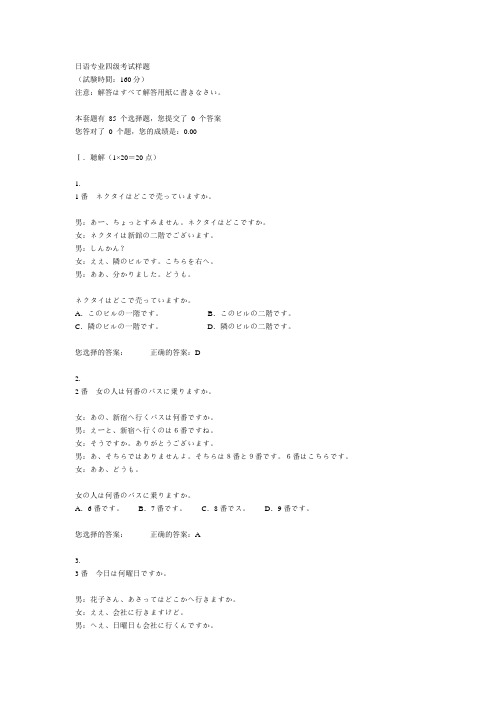
日语专业四级考试样题(試験時間:160分)注意:解答はすべて解答用紙に書きなさい。
本套题有85 个选择题,您提交了0 个答案您答对了0 个题,您的成绩是:0.00Ⅰ.聴解(1×20=20点)1.1番ネクタイはどこで売っていますか。
男:あー、ちょっとすみません。
ネクタイはどこですか。
女:ネクタイは新館の二階でございます。
男:しんかん?女:ええ、隣のビルです。
こちらを右へ。
男:ああ、分かりました。
どうも。
ネクタイはどこで売っていますか。
A.このビルの一階です。
B.このビルの二階です。
C.隣のビルの一階です。
D.隣のビルの二階です。
您选择的答案:正确的答案:D2.2番女の人は何番のバスに乗りますか。
女:あの、新宿へ行くバスは何番ですか。
男:えーと、新宿へ行くのは6番ですね。
女:そうですか。
ありがとうございます。
男:あ、そちらではありませんよ。
そちらは8番と9番です。
6番はこちらです。
女:ああ、どうも。
女の人は何番のバスに乗りますか。
A.6番です。
B.7番です。
C.8番でス。
D.9番です。
您选择的答案:正确的答案:A3.3番今日は何曜日ですか。
男:花子さん、あさってはどこかへ行きますか。
女:ええ、会社に行きますけど。
男:へえ、日曜日も会社に行くんですか。
女:いいえ、あさっては土曜日ですよ。
男:あれ、今日は金曜日でしょう。
女:いいえ、違いますよ。
男:あ、そうか。
今日は何曜日ですか。
A.木曜日です。
B.金曜日です。
C.土曜日です。
D.日曜日です。
您选择的答案:正确的答案:A4.4番男の人は昨日何をしましたか。
女:小林さん、昨日何をしましたか。
男:本を読んでいました。
女:じゃあ、うちにいたんですか。
男:いいえ。
女:あ、じゃあ、図書館?男:いいえ、天気がよかったから公園で。
女:ああ、いいですね。
男の人は昨日何をしましたか。
A.うちにいました。
B.公園で遊びました。
C.図書館に行きました。
D.外で本を読みました。
日语作文
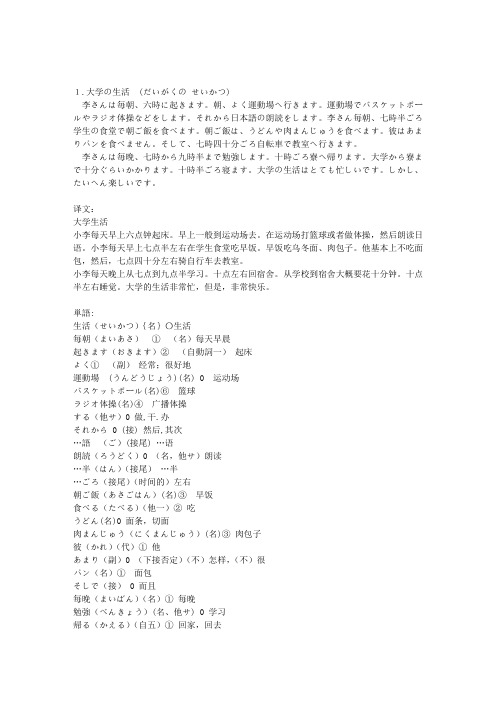
1.大学の生活 (だいがくのせいかつ)李さんは毎朝、六時に起きます。
朝、よく運動場へ行きます。
運動場でバスケットボールやラジオ体操などをします。
それから日本語の朗読をします。
李さん毎朝、七時半ごろ学生の食堂で朝ご飯を食べます。
朝ご飯は、うどんや肉まんじゅうを食べます。
彼はあまりパンを食べません。
そして、七時四十分ごろ自転車で教室へ行きます。
李さんは毎晩、七時から九時半まで勉強します。
十時ごろ寮へ帰ります。
大学から寮まで十分ぐらいかかります。
十時半ごろ寝ます。
大学の生活はとても忙しいです。
しかし、たいへん楽しいです。
译文:大学生活小李每天早上六点钟起床。
早上一般到运动场去。
在运动场打篮球或者做体操,然后朗读日语。
小李每天早上七点半左右在学生食堂吃早饭。
早饭吃乌冬面、肉包子。
他基本上不吃面包,然后,七点四十分左右骑自行车去教室。
小李每天晚上从七点到九点半学习。
十点左右回宿舍。
从学校到宿舍大概要花十分钟。
十点半左右睡觉。
大学的生活非常忙,但是,非常快乐。
単語:生活(せいかつ){名}〇生活每朝(まいあさ)①(名)每天早晨起きます(おきます)②(自動詞一)起床よく①(副)经常;很好地運動場(うんどうじょう)(名) 0 运动场バスケットボール(名)⑥篮球ラジオ体操(名)④广播体操する(他サ)0 做,干.办それから 0 (接) 然后,其次…語(ご)(接尾) …语朗読(ろうどく)0 (名,他サ)朗读…半(はん)(接尾)…半…ごろ(接尾)(时间的)左右朝ご飯(あさごはん)(名)③早饭食べる(たべる)(他一)②吃うどん(名)0 面条,切面肉まんじゅう(にくまんじゅう)(名)③肉包子彼(かれ)(代)①他あまり(副)0 (下接否定)(不)怎样,(不)很パン(名)①面包そしで(接) 0 而且每晚(まいばん)(名)①每晚勉強(べんきょう)(名、他サ) 0 学习帰る(かえる)(自五)①回家,回去かかる(自五)②花费,需要寝る(ねる)(自一)0睡,就寝忙しい(いそがしい)(形)④忙的しかし(接)②可是,但是たいへん(副)0 非常楽しい(たのしい)(形)③愉快的,高兴的日语作文春天的感觉親譲りの無鉄砲で小供の時から損ばかりしている。
2008年日语能力测试2级听力阅读翻译
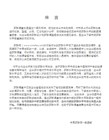
1. 会って伝える。
2. 手紙で伝える。
3. メールで伝える。
4. 電話で伝える。
問(13).
聴解スクリプト:
女の人と男の人が会社で話しています。女の人は今日この後どうすることにしましたか。
女性:お先に。
男性:お、はやいね。何か予定でもあるの。
女性:使い捨てじゃないから、環境にもやさしいし、割引もあるし、いいよね。
男性:割引?
女性:コーヒーショップにこれ持参すると、20 円引きになるでしょう。私、一階のコーヒーショップ、毎日利用するから、すごく助かってる。
男性:へー、そうなの。知らなかった。
女性:え、じゃ、どうして買ったの?カップの柄が気に入った?
女性:けっこう来るって聞いてるよ。そうか、人の大勢いるのか苦手なんだ。
男性:そんな。子供じゃないんだから。パーティーの前後に予定が詰まって、体がきついかなと思ってね。
女性:うーん、でも、今後の付き合いを考えると出ないわけにはいかないんじゃない。
男の人はどうしてパーティーに行きたくないと言っていますか。
男性:いや、ほら、これ冷たいものは冷たいまま、暖かいものは暖かいまま、飲める構造になっているでしょう。会社で使うには便利なんだよね。
女性:あ、そうだね。
男の人がこのカップを買った理由は何ですか。
1. 環境にいいからです。
2. コーヒーが安くなるからです。
3. カップの柄が好きだからです。
女性:はい、分かりました。よろしくお願いします。
男の人が今日時間がないのはどうしてですか。
1. 発表の原稿を書いているからです。
日语专业四级历年真题详解与考试指南【圣才出品】
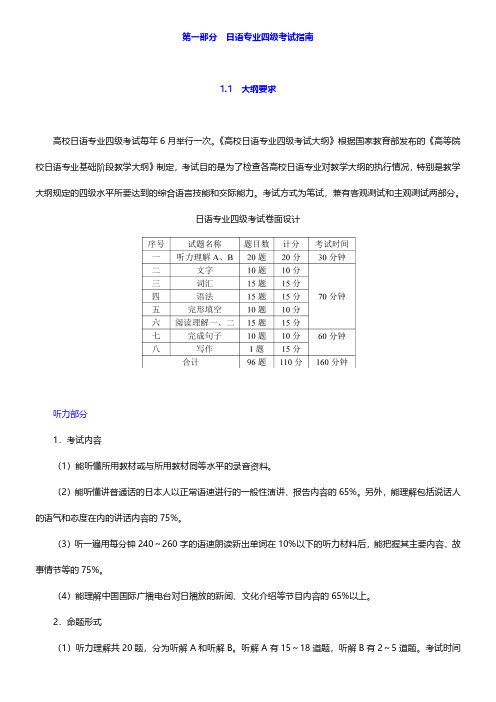
第一部分日语专业四级考试指南1.1大纲要求高校日语专业四级考试每年6月举行一次。
《高校日语专业四级考试大纲》根据国家教育部发布的《高等院校日语专业基础阶段教学大纲》制定,考试目的是为了检查各高校日语专业对教学大纲的执行情况,特别是教学大纲规定的四级水平所要达到的综合语言技能和交际能力。
考试方式为笔试,兼有客观测试和主观测试两部分。
日语专业四级考试卷面设计听力部分1.考试内容(1)能听懂所用教材或与所用教材同等水平的录音资料。
(2)能听懂讲普通话的日本人以正常语速进行的一般性演讲、报告内容的65%。
另外,能理解包括说话人的语气和态度在内的讲话内容的75%。
(3)听一遍用每分钟240~260字的语速朗读新出单词在10%以下的听力材料后,能把握其主要内容、故事情节等的75%。
(4)能理解中国国际广播电台对日播放的新闻、文化介绍等节目内容的65%以上。
2.命题形式(1)听力理解共20题,分为听解A和听解B。
听解A有15~18道题,听解B有2~5道题。
考试时间为30分钟。
各个小题之间有10秒钟的停顿时间用来选择答案。
(2)听解A以男女二人的对话为主,对话内容一般在15句以下。
题材以日常生活为主,涉及衣食住行、家庭生活、学习工作等各方面。
(3)听解B以单人的演讲、报告或说明为主,约10句话左右。
内容多与日常生活相关,涉及人物介绍、行为安排或对某一事件的概括、感想等。
文字词汇部分1.考试内容(1)对文字的测试内容主要是能写出《基础阶段教学大纲》词汇表中所规定的日语汉字的正确读者以及根据读音写出相应的汉字。
掌握常用日语汉字的音读、训读以及特殊读音。
(2)对词汇的测试范围主要包括教学大纲以及四级考试大纲里包含的约5500个词汇。
2.命题形式文字试题共10道,包括根据汉字选择正确的读音以及根据读音选择正确的汉字。
词汇试题共15道,包括对某个单词的考查以及对固定搭配、惯用句等的考查。
语法部分1.考试内容日语专业四级考试语法部分主要考查以下几个方面的内容:(1)对于格助词、副助词、终助词、接续助词等助词的理解和运用能力。
2008年日语高考(聴解なし)
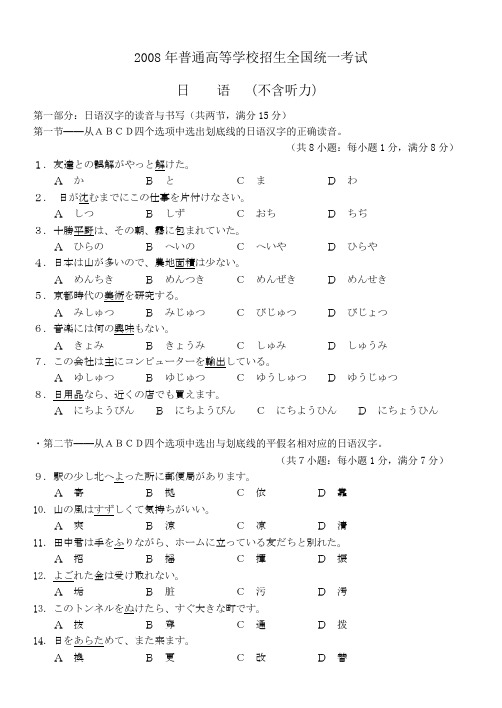
2008年普通高等学校招生全国统一考试日语(不含听力)第一部分:日语汉字的读音与书写(共两节,满分15分)第一节――从ABCD四个选项中选出划底线的日语汉字的正确读音。
(共8小题:每小题1分,满分8分)1.友達との誤解がやっと解けた。
AかBとCまDわ2.日が沈むまでにこの仕事を片付けなさい。
AしつBしずCおちDちぢ3.十勝平野は、その朝、霧に包まれていた。
AひらのBへいのCへいやDひらや4.日本は山が多いので、農地面積は少ない。
AめんちきBめんつきCめんぜきDめんせき5.京都時代の美術を研究する。
AみしゅつBみじゅつCびじゅつDびじょつ6.音楽には何の興味もない。
AきょみBきょうみCしゅみDしゅうみ7.この会社は主にコンピューターを輸出している。
AゆしゅつBゆじゅつCゆうしゅつDゆうじゅつ8.日用品なら、近くの店でも買えます。
AにちようびんBにちようぴんCにちようひんDにちょうひん・第二节――从ABCD四个选项中选出与划底线的平假名相对应的日语汉字。
(共7小题:每小题1分,满分7分)9.駅の少し北へよった所に郵便局があります。
A寄B拠C依D靠10.山の風はすずしくて気持ちがいい。
A爽B涼C凉D清11.田中君は手をふりながら、ホームに立っている友だちと別れた。
A招B揺C揮D振12.よごれた金は受け取れない。
A垢B脏C污D汚13.このトンネルをぬけたら、すぐ大きな町です。
A抜B穿C通D拨14.日をあらためて、また来ます。
A換B更C改D替15.子どもはあまりえんりょしない。
A遠虑B远虑C远遠D遠慮第二部分:日语知识运用――从每小题给出的四个选项中,选出一个最佳选项。
(共45小题:每小题1分,满分45分)16.李さんは人前___緊張しがちです。
AにBでCへDが17.かれは成功の第一歩を踏み出した。
AとBでCにDへ18.かれは有名な俳優で毎日テレビ出ています。
AをBにCでDから19.日本のアパートの狭さびっくりしてしまった。
专四08年完型与阅读部分真题及答案
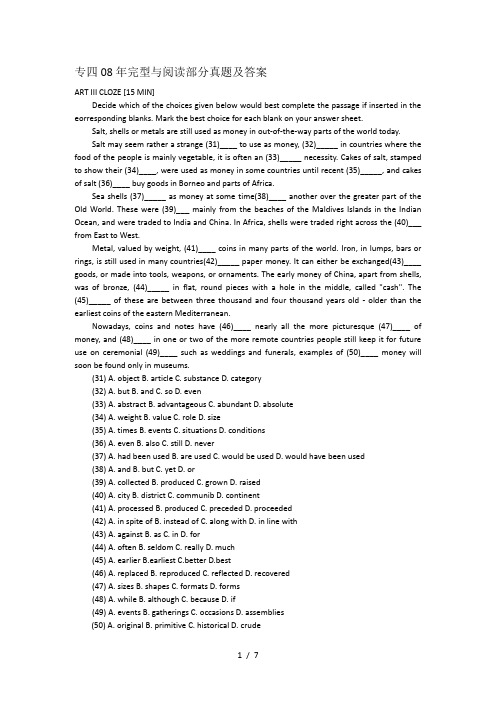
专四08年完型与阅读部分真题及答案ART III CLOZE [15 MIN]Decide which of the choices given below would best complete the passage if inserted in the eorresponding blanks. Mark the best choice for each blank on your answer sheet.Salt, shells or metals are still used as money in out-of-the-way parts of the world today.Salt may seem rather a strange (31)____ to use as money, (32)_____ in countries where the food of the people is mainly vegetable, it is often an (33)_____ necessity. Cakes of salt, stamped to show their (34)____, were used as money in some countries until recent (35)_____, and cakes of salt (36)____ buy goods in Borneo and parts of Africa.Sea shells (37)_____ as money at some time(38)____ another over the greater part of the Old World. These were (39)___ mainly from the beaches of the Maldives Islands in the Indian Ocean, and were traded to India and China. In Africa, shells were traded right across the (40)___ from East to West.Metal, valued by weight, (41)____ coins in many parts of the world. Iron, in lumps, bars or rings, is still used in many countries(42)_____ paper money. It can either be exchanged(43)____ goods, or made into tools, weapons, or ornaments. The early money of China, apart from shells, was of bronze, (44)_____ in flat, round pieces with a hole in the middle, called "cash". The (45)_____ of these are between three thousand and four thousand years old - older than the earliest coins of the eastern Mediterranean.Nowadays, coins and notes have (46)____ nearly all the more picturesque (47)____ of money, and (48)____ in one or two of the more remote countries people still keep it for future use on ceremonial (49)____ such as weddings and funerals, examples of (50)____ money will soon be found only in museums.(31) A. object B. article C. substance D. category(32) A. but B. and C. so D. even(33) A. abstract B. advantageous C. abundant D. absolute(34) A. weight B. value C. role D. size(35) A. times B. events C. situations D. conditions(36) A. even B. also C. still D. never(37) A. had been used B. are used C. would be used D. would have been used(38) A. and B. but C. yet D. or(39) A. collected B. produced C. grown D. raised(40) A. city B. district C. communib D. continent(41) A. processed B. produced C. preceded D. proceeded(42) A. in spite of B. instead of C. along with D. in line with(43) A. against B. as C. in D. for(44) A. often B. seldom C. really D. much(45) A. earlier B.earliest C.better D.best(46) A. replaced B. reproduced C. reflected D. recovered(47) A. sizes B. shapes C. formats D. forms(48) A. while B. although C. because D. if(49) A. events B. gatherings C. occasions D. assemblies(50) A. original B. primitive C. historical D. crudePART V READING COMPREHENSION [25 MIN]In this section there are four passages followed by questions or unfinished statements, each with four suggested answers marked A, B, C and D. Choose the one that you think is the best answer. Mark your answers on your answer sheet.TEXT AWhen the sun is up in Amsterdam, the largest city in the Netherlands sits quietly on theAmstel River. You can rent a bicycle, visit the Van Gogh or Anne Frank museum, or take a water taxi.But when the sun goes down, the partying begins. In the big clubs and in coffee shops,tourists gather to hang out, talk politics and smoke.Several areas of the city clearly show the two worlds that rule Amsterdam. And they're allwithin a short cab ride of each other.For example, Dam Square attracts daytime sightseers to its festivals, open markets, concerts and other events. Several beautiful and very popular hotels can be found there. And there is the Royal Palace and the Magna Plaza shopping mall.But as evening descends on Dam Square so do the party-seekers. Hip pop or funk music begins blaring from Club Paradiso and Club Melkweg. These are two of the most popular clubs in Europe. So if you come, be ready to dance. The clubs don't shut down until 4 am.And while you are there, check out the various inexpensive ways to tour the city. Don't worry about getting lost. Although Dutch is the official language, most people in Amsterdam speak English and are happy to help you with directions.And you'll notice that half the people in the streets are on bicycles. They rent for US$17 to $20 for a whole day.Amsterdam also has a good canal system. From anywhere between U852 and $9.50, you can use the canal bus or a water taxi to cruise the "Venice of the North".You can take in the picturesque canal house architecture: The rows of neat, narrow four-story dwellings of brownstone with large windows are well worth seeing. Many of them are several centuries old.You might also want to jump out of the canal bus at the Museum Quarter and start walking. Masterpieces by Dutch artists such as Rembrandt, Bruegel, Van Gogh and others are on display at the Van Gogh Museum, Rembrandt House and others.The city has an appreciation of its historic past. One place to visit is the Anne Frank House in Nine Streets. It was there that the young Jewish girl wrote her famous diary during World War II. Visitors can view Anne's original diary and climb behind the bookcase to the room where she and her family hid from the Nazis for two years.81. At the beginning of the passage, the author indicates thatA. Amsterdam is generally known as a quiet city.B. parties go on all day long in Amsterdam,C. Amsterdam presents two different pictures.D. Amsterdam attracts many daytime visitors.82. Which tourist attraction is cited for elaboration in Paragraphs Four and Five?A. Royal Palace.B. Dam Square.C. Club Paradiso.D. Magna Plaza.83. According to the passage, the local people have all the following characteristics EXCEPTA. they are party goers.B. they show hospitality.C. they can speak English.D. they are fond of cycling.84. Which of the following adjectives can best describe Amsterdam as a tourist city?A. Modern.B. Delightful.C. Quiet.D. Historic.TEXT BIn an article some Chinese scholars are described as being "tantalized by the mysteriousdragon bone hieroglyphics." Tantalized is one of many English words that have their origins in myths and legends of the past (in this case, Greek and Roman ones). The meaning of the verb tantalize is a very particular one: "to promise or show something desirable to a person and then take it away; to tease by arousing hope." Many (but not all) English dictionaries give you a brief indication of a word's origins in brackets before or after the explanation of the meaning. For tantalize the following explanation is given: [> Tantalus]. This means that you should look up the name Tantalus to find out the word's origins, and if you do, you will find out that in Greek mythology, Tantalus was a king who was punished in the lower world with eternal hunger and thirst; he was put up to his chin in water that always moved away when he tried to drink it and with fruit on branches above him placed just a little bit out of his reach. Can you see why his name was changed into a verb meaning "to tease or torment by arousing desire"?Another example is the word siren, familiar to us as the mechanical device that makes such an alarming sound when police cars, ambulances, or fire engines approach. This word also has its origins in Greek mythology. The traveler Odysseus (Ulysses to the Romans) made his men plug their ears so that they wouldn't hear the dangerous voices of the sirens, creatures who were half bird and half woman and who lured sailors to their deaths on sharp rocks. So the word came to be associated both with a loud sound and with danger!When someone speaks of a "jovial mood" or a "herculean effort," he or she is using words with origins in mythology. Look these words up to find their meaning and relationship to myths.Many common words, such as the names for the days of the week and the months of the year, also come from mythology. Wednesday derives from the ancient Norse king of the gods, Woden, and Thursday was originally Thor's day, in honour of Thor, the god of thunder. As a matter of fact, all the planets, except the one we live on, bear names that come from Roman mythology,including the planet that is farthest away from the sun and for that reason was called after the Roman god of the dead. This god has also given his name to one of the chemical elements.Several other elements have names that come from mythology, too.It seems that myths and legends live on in the English language85. The purpose of the first sentence in Paragraph One is ____.A. to describe the work of some Chinese scholars.B. to arouse readers' interest in hieroglyphics.C. to lead readers onto the main theme.D. to link the preceding part to the present one.86. We learn from the passage, all English dictionaries include _____.A. legends.B. mythology.C. word origins.D. word definitions.87. The example of tantalize is to show _____.A. how the word came into existence.B. how Tantalus was punished in the lower world.C. how all English dictionaries show word origins.D. how the meaning of the word changed over the years.88. According to the passage, which of the following does NOT have origins in myths orlegends?A. Jovial.B. Wednesday.C. Earth.D. March.89. Which of the following can best serve as the title of the passage?A. Greek and Roman Mythology in Language.B. Mythological Origins of English Words.C. Historical Changes in Word Meanings.D. Mythology and Common Words.TEXT CMy heart sank when the man at the immigration counter gestured to the back room. l'm an American born and raised, and this was Miami, where I live, but they weren't quite ready to let me in yet."Please wait in here, Ms Abujaber," the immigration officer said. My husband, with his very American last name, accompanied me. He was getting used to this. The same thing had happened recently in Canada when I'd flown to Montreal to speak at a book event. That time they held me for 45 minutes. Today we were returning from a literary festival in Jamaica, and I was startled that I was being sent "in back" once again.The officer behind the counter called me up and said, "Miss, your name looks like the name of someone who's on our wanted list. We're going to have to check you out with Washington.""How long will it take?""Hard to say ... a few minutes," he said. "We'll call you when we're ready for you." After an hour, Washington still hadn't decided anything about me. "Isn't this computerized?"I asked at the counter. "Can't you just look me up?"Just a few more minutes, they assured me.After an hour and a half, I pulled my cell phone out to call the friends I was supposed to meet that evening. An officer rushed over. "No phones!" he said. "For all we know you could be calling a terrorist cell and giving them information.""I'm just a university professor," I said. My voice came out in a squeak."Of course you are. And we take people like you out of here in leg irons every day."I put my phone away.My husband and 1 were getting hungry and tired. Whole families had been brought into the waiting room, and the place was packed with excitable children, exhausted parents, even a flight attendant.I wanted to scream, to jump on a chair and shout: "I'm an American citizen; a novelist; lprobably teach English literature to your children." Or would that all be counted against me?After two hours in detention, I was approached by one of the officers. "You're free to go," he said. No explanation or apologies. For a moment, neither of us moved, we were still in shock.Then we leaped to our feet."Oh, one more thing." He handed me a tattered photocopy with an address on it. "If you weren't happy with your treatment, you can write to this agency.""Will they respond?" I asked."I don't know --- I don't know of anyone who's ever written to them before." Then he added,"By the way, this will probably keep happening each time you travel internationally.""What can I do to keep it from happening again?"He smiled the empty smile we'd seen all day. "Absolutely nothing."After telling several friends about our ordeal, probably the most frequent advice I've heard in response is to change my name. Twenty years ago, my own graduate school writing professor advised me to write under a pen name so that publishers wouldn't stick me in what he called "the ethnic ghetto" --- a separate, secondary shelf in the bookstore. But a name is an integral part of anyone's personal and professional identity -just like the town you're born in and the place where you're raised.Like my father, I'll keep the name, but my airport experience has given me a whole new perspective on what diversity and tolerance are supposed to mean. I had no idea that being an American would ever be this hard.90. The author was held at the airport because _____.A. she and her husband returned from Jamaica.B. her name was similar to a terrorist's.C. she had been held in Montreal.D. she had spoken at a book event.91. She was not allowed to call her friends because _____.A. her identity hadn't been confirmed yet.B. she had been held for only one hour and a half.C. there were other families in the waiting room.D. she couldn't use her own cell phone.92. We learn from the passage that the author would _____ to prevent similar experiencefrom happening again.A. write to the agencyB. change her nameC. avoid traveling abroadD. do nothing93. Her experiences indicate that there still exists _____ in the US.A. hatredB. discriminationC. toleranceD. diversity94. The author sounds in the last paragraph.A. impatientB. bitterC. worriedD. ironicTEXT DPublic speaking fills most people with dread. Humiliation is the greatest fear; self-exposure andfailing to appeal to the audience come a close second. Women hate it most, since girls are pressurized from an early age to be concerned with appearances of all kinds.Most people have plenty of insecurities, and this seems like a situation that will bring them out. If you were under pressure to be perfect, you are terrified of falling in the most public of ways. While extroverts will feel less fear before the ordeal, it does not mean they will necessarily do it better. Some very shy people manage to shine. When I met the British comedian Julian Clary, he was shy and cautious, yet his TV performances are perfect.In fact, personality is not the best predictor of who does it well. Regardless of what you are like in real life, the key seems to be to act yourself.Actual acting, as in performing the scripted lines of a character other than yourself, does not do the job. While politicians may limit damage by having carefully rehearsed, written scripts to speak from, there is always a hidden awareness among the audience that the words might not be true.Likewise, the incredibly perfect speeches of many American academics are far from natural.You may end up buying their book on the way out, but soon afterwards, it is much like fast food, and you get a nameless sense that you've been cheated.Although, as Earl Spencer proved at his sister Princess Diana's funeral, it is possible both to prepare every word and to act naturally. A script rarely works and it is used to help most speakers.But, being yourself doesn't work either. If you spoke as if you were in your own kitchen, itwould be too authentic, too unaware of the need to communicate with an audience.I remember going to see British psychiatrist R. D. Laing speak in public. He behaved like a seriously odd person, talking off the top of his head. Although he was talking about madness and he wrote on mental illness, he seemed to be exhibiting rather than explaining it.The best psychological place from which to speak is an unselfconscious self-consciousness, providing the illusion of being natural. Studies suggest that this state of "flow", as psychologists call it, is very satisfying.95. Women hate public speaking most mainly because of _____.A. their upbringing very early on.B. their inability to appeal to the audience.C. their sense of greater public pressure.D. their sense of greater humiliation.96. "this" in Paragraph Two refers toA. insecurity.B. sense of failure.C. public speaking.D. pressure.97. Which of the following is NOT the author's viewpoint?A. Acting like performers spoils the message in a speech.B. Perfection of scripts is necessary in making good impressions.C. Acting naturally means less dependence on the prepared script.D. There should be a balance between actual acting and acting naturally.98. What is the author's view on personality?A. Personality is the key to success in public speaking.B. Extroverts are better public speakers.C. Introverts have to learn harder to be good speakers.D. Factors other than personality ensure better performance.99. The author implies that while speaking R. D. Laing _____.A. was both too casual and authentic.B. was acting like a performer.C. was keeping a good balance.D. was aware of his audience.100. In the last paragraph the author recommends that ____.A. you forget about your nervousness.B. you feel natural and speak naturally.C. you may feel nervous, but appear naturally.D. you may imagine yourself to be naturalPART III CLOZE31-35 CADBA 36-40 CADAD 41-45 CBDAB 46-50 ADBCBPART IV GRAMMAR & VOCABULARY51-55 DBDCB 56-60 CDCDB 61-65 ACDAB 66-70 DCADB[文档可能无法思考全面,请浏览后下载,另外祝您生活愉快,工作顺利,万事如意!]。
日语专四成绩表

顾爱斯 张君 何燕南 姚莉敏 何艳 郁凌虚 夏奕娜 曹静 吴晓藻 鲍雪莲 王慧磊 董晓萍 臧子芸 尚颖颖 顾薪
87 85 82 76 77 92 95 84 90 91 95 86 81 92 84
良好 良好 良好 合格 良好 优秀 优秀 良好 优秀 优生60人,合格率98.3%,优良率88.3% 学号 姓名 总分 等级 40204044101 隋昊 91 优秀 40204044103 刘玮 95 优秀 40204044104 李悦赟 71 合格 40204044105 金春平 93 优秀 40204044106 胡英杰 86 良好 40204044107 谈怡俊 81 良好 40204044108 周一凡 79 良好 40204044109 张晔 72 合格 40204044110 王茵华 84 良好 40204044111 邱玫萍 72 合格 40204044112 沈丹 89 优秀 40204044113 金慧晔 88 优秀 40204044114 刘师雯 84 良好 40204044115 帅莹 99 优秀 40204044116 张洁云 90 优秀 40204044117 耿小婷 82 良好 40204044118 张燕华 95 优秀 40204044119 陆秀娟 96 优秀 40204044120 张文婧 85 良好 40204044121 张梦圆 94 优秀 40204044122 陈晓静 85 良好 40204044123 徐正莉 82 良好 40204044127 傅卓君 89 优秀 40204044128 严潇奕 86 良好 40204044129 阎洁婷 80 良好 40204044130 陈丽莉 87 良好 40204044131 王磊 94 优秀 40204044132 丁夏萍 92 优秀 40204044201 朱嗣敏 90 优秀 40204044202 刘科伟 89 优秀 40204044203 周卿 84 良好 40204044204 陈云翔 56 40204044205 陈斌 81 良好 40204044206 丁浩 66 合格 40204044207 张裕隆 82 良好 40204044208 瞿懿 91 优秀 40204044209 潘专红 81 良好 40204044210 黄好 79 良好 40204044211 陆怡 91 优秀 40204044212 王颖文 93 优秀 40204044213 张文静 71 合格 40204044214 席与惠 86 良好 40204044215 诸昊珒 89 优秀 40204044216 康玲梅 81 良好 40204044217 贾佳 85 良好
日语专业四级模拟试题(一)
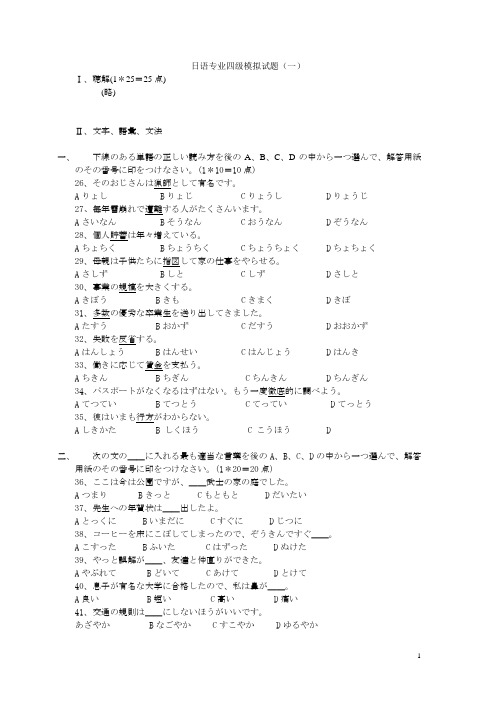
日语专业四级模拟试题(一)Ⅰ、聴解(1*25=25点)(略)Ⅱ、文字、語彙、文法一、下線のある単語の正しい読み方を後のA、B、C、Dの中から一つ選んで、解答用紙のその番号に印をつけなさい。
(1*10=10点)26、そのおじさんは猟師として有名です。
Aりょし BりょじCりょうしDりょうじ27、毎年雪崩れで遭難する人がたくさんいます。
AさいなんBそうなんCおうなん Dぞうなん28、個人貯蓄は年々増えている。
Aちょちく BちょうちくCちょうちょく Dちょちょく29、母親は子供たちに指図して家の仕事をやらせる。
AさしずBしと Cしず Dさしと30、事業の規模を大きくする。
AきぼうBきもCきまくDきぼ31、多数の優秀な卒業生を送り出してきました。
AたすうBおかずCだすうDおおかず32、失敗を反省する。
AはんしょうBはんせいCはんじょうDはんき33、働きに応じて賃金を支払う。
AちきんBちぎんCちんきんDちんぎん34、パスポートがなくなるはずはない。
もう一度徹底的に調べよう。
Aてつてい Bてつとう CてっていDてっとう35、彼はいまも行方がわからない。
Aしきかた B しくほう C こうほう D二、次の文の__に入れる最も適当な言葉を後のA、B、C、Dの中から一つ選んで、解答用紙のその番号に印をつけなさい。
(1*20=20点)36、ここは今は公園ですが、__武士の家の庭でした。
Aつまり BきっとCもともとDだいたい37、先生への年賀状は__出したよ。
AとっくにBいまだにCすぐにDじつに38、コーヒーを床にこぼしてしまったので、ぞうきんですぐ__。
AこすったBふいたCはずった Dぬけた39、やっと誤解が__、友達と仲直りができた。
AやぶれてBどいて CあけてDとけて40、息子が有名な大学に合格したので、私は鼻が__。
A良いB短いC高いD痛い41、交通の規則は__にしないほうがいいです。
あざやかBなごやかCすこやかDゆるやか42、田中さんが__出て行ったので、誰も気づきませんでした。
2000-2019历年专四语法真题参考答案(完整版)
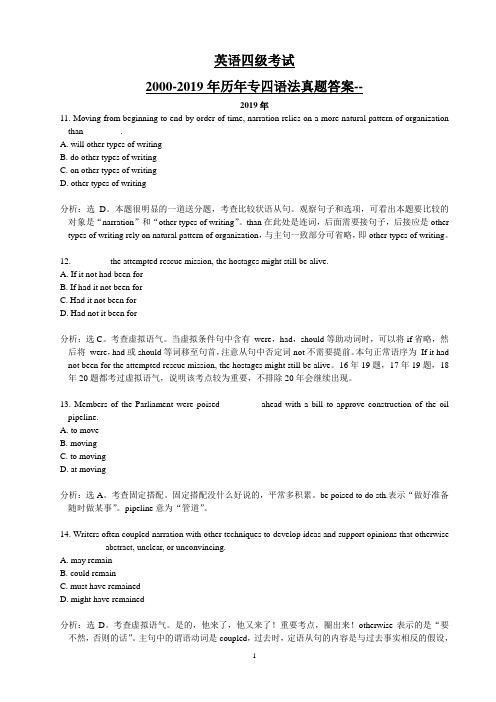
英语四级考试2000-2019年历年专四语法真题答案--2019年11. Moving from beginning to end by order of time, narration relies on a more natural pattern of organization than ________.A. will other types of writingB. do other types of writingC. on other types of writingD. other types of writing分析:选D。
本题很明显的一道送分题,考查比较状语从句。
观察句子和选项,可看出本题要比较的对象是“narration”和“other types of writing”。
than在此处是连词,后面需要接句子,后接应是other types of writing rely on natural pattern of organization,与主句一致部分可省略,即other types of writing。
12. ________ the attempted rescue mission, the hostages might still be alive.A. If it not had been forB. If had it not been forC. Had it not been forD. Had not it been for分析:选C。
考查虚拟语气。
当虚拟条件句中含有were,had,should等助动词时,可以将if省略,然后将were,had或should等词移至句首,注意从句中否定词not不需要提前。
本句正常语序为If it had not been for the attempted rescue mission, the hostages might still be alive。
日语专业四级考试(作文部分的指导)
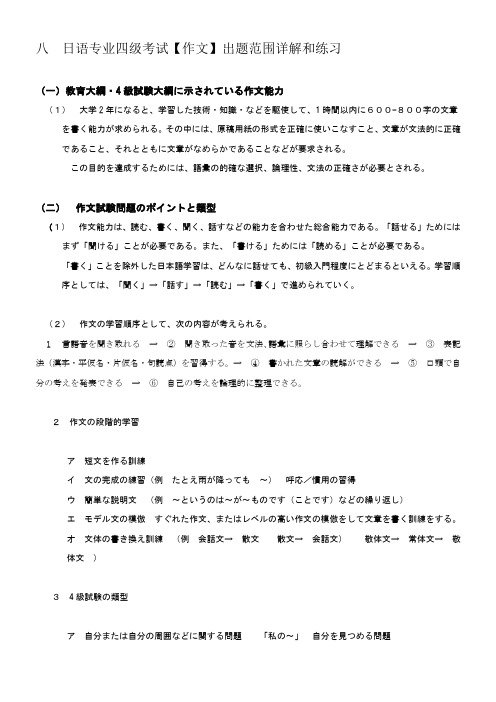
八日语专业四级考试【作文】出题范围详解和练习(一)教育大綱・4級試験大綱に示されている作文能力(1)大学2年になると、学習した技術・知識・などを駆使して、1時間以内に600-800字の文章を書く能力が求められる。
その中には、原稿用紙の形式を正確に使いこなすこと、文章が文法的に正確であること、それとともに文章がなめらかであることなどが要求される。
この目的を達成するためには、語彙の的確な選択、論理性、文法の正確さが必要とされる。
(二)作文試験問題のポイントと類型(1)作文能力は、読む、書く、聞く、話すなどの能力を合わせた総合能力である。
「話せる」ためにはまず「聞ける」ことが必要である。
また、「書ける」ためには「読める」ことが必要である。
「書く」ことを除外した日本語学習は、どんなに話せても、初級入門程度にとどまるといえる。
学習順序としては、「聞く」→「話す」→「読む」→「書く」で進められていく。
(2)作文の学習順序として、次の内容が考えられる。
1言語音を聞き取れる→②聞き取った音を文法、語彙に照らし合わせて理解できる→③表記法(漢字・平仮名・片仮名・句読点)を習得する。
→④書かれた文章の読解ができる→⑤口頭で自分の考えを発表できる→⑥自己の考えを論理的に整理できる。
2作文の段階的学習ア短文を作る訓練イ文の完成の練習(例たとえ雨が降っても~)呼応/慣用の習得ウ簡単な説明文(例~というのは~が~ものです(ことです)などの繰り返し)エモデル文の模倣すぐれた作文、またはレベルの高い作文の模倣をして文章を書く訓練をする。
オ文体の書き換え訓練(例会話文→散文散文→会話文)敬体文→常体文→敬体文)34級試験の類型ア自分または自分の周囲などに関する問題「私の~」自分を見つめる問題例私の~家家族友人学校故郷村大学など→紹介文具体性が例私の~夢趣味長所短所理想将来→性格・人生観動物ペット上記の類型の作文の要点は具体性と個性である。
- 1、下载文档前请自行甄别文档内容的完整性,平台不提供额外的编辑、内容补充、找答案等附加服务。
- 2、"仅部分预览"的文档,不可在线预览部分如存在完整性等问题,可反馈申请退款(可完整预览的文档不适用该条件!)。
- 3、如文档侵犯您的权益,请联系客服反馈,我们会尽快为您处理(人工客服工作时间:9:00-18:30)。
大学日本語専攻生四級能力試験問題(2008年)(試験時間:160分)注意:解答はすべて解答用紙に書きなさい。
第一部分Ⅰ聴解(1×20=20点)Ⅱ文字・語彙・文法一、次の文を下線をつけた単語の正しい読み方や漢字を、後のA、B、C、Ⅾから一つ選びなさい。
(1×10=10点)21.そまつな毎日の食事に飽きた。
A粗末B粗燥C粗雑Ⅾ粗大22.病後のけいかは、良好である。
A結果B恵果C経過Ⅾ慶賀23.父の店が大変はんじょうしている。
A繁状B繁盛C斑壮Ⅾ繁亢24.自分へのごほうびに海外旅行にいった。
A奨美B褒美C報美Ⅾ奨美25.心地よう音楽を聴きながら、食事をする。
AここちBこころちCここじⅮこころじ26.登山に必要なものを集めてもらいます。
AとうざんBとうさんCとさんⅮとざん27.梅雨があけて夏がやってきた。
AうめうめBばいあめCつゆⅮつうゆう28.事故の原因は目下調査中です。
A めしたBめかCもっかⅮもくげ29.彼の指図に従った人間は、一人もいなかったようです。
AしずBゆびずCさしとⅮさしず30.乗り換えの時間を車掌に聞いた。
AしゃちょうBしゃしょうCしゃちゅうⅮしゃじょう二、次の文の___に入れるのに最も適当な言葉を後のA、B、C、Ⅾから一つ選びなさい。
(1×15=15点)31.____そんなことはありえないだろう。
AなにかBまさかCさすがⅮおろか32.____学生たちの前で講義することになった。
AなぜBなにCなんとⅮなにも33.父親には、看病する能力を____期待していないようだ。
AあたりBあかりCあさりⅮあまり34.一般の家の中では神棚と仏壇が同じ家の中に____ている。
AかわされBかまわれCかなわれⅮまつられ35.自分のことばかり考えているあいつは本当に虫の____やつだ。
AいいBよくないC悪いⅮ悪くない36.あの外人さんはまるで日本人のように____日本語をしゃべっている。
AのどかなBしずかなCなめらかなⅮほがらかな37.自分の将来をちっとも心配しない彼は本当に____人だ。
A元気なB呑気なC平気Ⅾ根気38.ここに____してください。
AサインBサービスCサークルⅮサラリーマン39.政治家になる夢はもう____て、故郷に帰ろうと思います。
AあこがれBあてられCあきらめⅮあらわれ40.間が____返事を寄こされ、本当に困っている。
A抜けたB掛けたC避けたⅮ空けた41.これは若者に的を____商品です。
A絞ったB付けたC当てたⅮ置いた42.そろそろ本音を____、どうですか。
A考えたらB歌ったらC叫んだらⅮ吐いたら43.ここは段差がありますから足元に____を付けてください。
A目B気C手Ⅾ足44.味が濃かったら,お湯で____もいいんですよ。
AまぜてBゆでてCいためてⅮうすめて45.突然お伺いしまして、____。
A失礼ですBお邪魔しますC恐縮ですⅮ構いません三、次の文の____に入れるのに最も適当なものを、後のA,B,C,Ⅾから一つ選びなさい。
(1×15=15点)46.不意に横____声を掛けられ、私は顔を上げた。
AへBにCでⅮから47.誰____知っている歌で、「春が来た、春来た」という文句で始まる歌がある。
AでもBにもCがⅮも48.この二群の稚魚たちは、7月から8月____の間にお互いに交じり合って見られるようになる。
AくらいBだけCにかけてⅮにまで49.そんなことを____、ことばの基礎にある体の働きを殺してしまうことになるのです。
AするならBしてはCするにはⅮしても50.日本では、朝____時、「おはようございます。
」と挨拶し、夜____時、「おやすみなさい。
」と挨拶します。
A起きる/寝るB起きる/寝たC起きた/寝るⅮ起きた/寝た51.机の上には、たくさんの作品が並べられて____。
AあったBいったCきたⅮおいた52.大きな鳥が、____鳴きながら、海のほうへ飛んでいった。
A悲しいようにB悲しそうなC悲しいようなⅮ悲しそうに53.この橋は一見____、ごく普通のコンクリート橋である。
AしたところでBするところでCしたところⅮするところ54.子供といえども、本人が注意深く____すれば、大事には至らないだろう。
AやってさえBやりさえCやるさえⅮやれさえ55.彼は毎朝、自転車に乗って新聞を配達しているの____。
AようですBだらしいですCそうですⅮだそうです56.紙に包んだ二人分のおやつを、時おり妻が____やった。
A持たせてB持たれてC持ててⅮ持ちたくて57.両親の手紙を読みたびに、故郷のことが____。
A思い出すB思い出せるC思い出させるⅮ思い出される58.こうして、農耕地のための熱帯林破壊が際限なく続けられる____。
AことにするBことになるCものにするⅮものになる59.愛する友は、おまえを信じた____、やがて殺されなければならない。
AばかりにBだけにCほどにⅮくらいに60.長い旅で、さぞ____。
Aお疲れさまでしたBお疲れになったでしょうCご苦労さまでしたⅮご苦労さまになったでしょうⅢ読解四、次の文章の( )に入る最も適当な言葉を、後のA、B、C、Ⅾから一つ選びなさい。
(1×10=10点)日本の気候の特徴は、はっきりと四つの季節に分かれていることである。
( 61 )、しばしば外国人の方から、お叱りを受けるそうだ。
他の国々にだって季節は四つある。
別に日本だけが特別なわけじゃない。
確かにそうかもしれない。
でもこれは、日本と外国を比べる時に必ず使われてきた言い回しなのだ。
あるいは、日本の英語教育の中では、既に常識となっている表現であるといってもいい。
( 62 )、日本の学生が、外国人に向かって日本のことを説明する時には、必ず話のどこかにこのフレーズ[注1]が入れられる。
もちろん、特別に日本の気候は素晴らしいと誇りたいわけではない。
ただ、外国に日本を伝えるという状況( 63 )、条件反射的に口から出てしまうのだ。
(64 )、そんな決まりきった内容の話など、外国の人が聞きたがるはずがない。
彼らが聞きたいのは、( 65 )日本の文化や、国際問題に対する一日本人の見解であり、要するに心の底から湧き上がって来る真実の声なのだ。
けれども、( 66 )ことを話せるようにする英語教育は日本にはほとんどない。
英語を使える人間は増えても、英語でコミュニケート[注2]できる人間はなかなか現れてこないのだ。
こうした現状の背景には、日本が育ててきた固有の文化を知らない( 67 )が多いということがある。
語るべき内容を持っていないのだ。
話せるわけがない。
(68 )英語教育だけに問題があるのではなさそうだ。
情報が瞬間的に世界中を飛び交い、地球の反対側の国で起きた出来事が、( 69 )隣の家で起きた事件であるかのように報道される時代にあっては、とりわけ自分の本音[注3]を正直に語れる勇気と能力が必要とされる。
まず、語るべき内容をしっかりと自らの内に持つことである。
( 70 )、地球上の国々と仲良く付き合っていくための英語とは何か、日本の英語教育、さらには日本人の英語観を改めて見直す[注4]時代に来ているようだ。
注1:フレーズ/句、成句。
注2:コミュニケート/意志を伝えること。
注3:本音/本心。
注4:見直す/気づかなかった値うちを認める。
評価を変える。
61.Aと思うとBと表すとCと考えるとⅮと言うと62.AだからBするとCならばⅮそこに63.AにするとBが来るとCになるとⅮが現れると64.AそしてBしかしCだからⅮまたは65.AたとえばBそういえばCできればⅮよければ66.AこんなBそんなCあんなⅮどんな67.A外国人B大学生C日本人Ⅾ留学生68.AそれもBどうもCそれでもⅮどうしても69.AまるでBじつにCたぶんⅮもはや70.AさらにはBなおまたCいっそうⅮその上で五、次の各文章を読んで、後の質問に答えなさい。
答えはそれぞれA、B、C、Ⅾの中から最も適当なものを一つ選なさい。
(1×5=5点)(文章1)ある栄養士養成学校の学生を対象に行った調査によると、同じ料理を食べた時に、①一年生よりも二年生のほうが味付けが濃いと感じる割合が多かったそうだ。
栄養学を学ぶにしたがって、塩分の問題が意識されてくるのかもしれない。
味覚は生活習慣によって影響を受けやすいものだ。
家庭での食事が濃い味付けであれぼ、うす味の料理はおいしくないと感じるようになる。
激辛(ブームの時には、日本人の味を識別する感覚は純くなっていたかも知れない。
健康のためにもなるべくうす味に慣れて、味に対する感覚を鈍くしていきたいものだ。
そのためには、食物を味わって食べる習慣をつけることも大切なことの一つであろう。
注:激辛/食べ物で、極めて辛い味のもの。
71.①一年生よりも二年生のほうが味付けが濃いと感じる割合が多かったそうだとあるが、なぜか。
A二年生のほうが、家庭料理の味付けの濃い学生が多いから。
B二年生のほうが、家庭料理の味付けの薄い学生が多いからC長く栄養学を勉強している二年生は塩分の問題を意識しているからⅮ激辛ブームを経験している二年生は塩分の問題を意識しているから。
72.この文章の内容と最も合っているものはどれか。
Aうす味に慣れることと意識することで味覚は鋭くなる。
B日本の家庭料理は濃い味付けなので、おいしくない。
Cうす味に慣れると、味覚は純くなる。
Ⅾ生活習慣を変えても味覚は変わらない。
(文章2)日本にいると、雨が降れば傘をさすことはごく当たり前のことのように思えますが、世界の国々ではけっして①そうではありません。
ある国ではスコール(注1)とかシャワーのような非常に強い雨が短時間に降りますが、そういう雨はあまりに強すぎて傘をさしても意味がなく、どこかで雨宿り(注2)をして、雨が通り過ぎ、降り止むのを待つほがずっと簡単です。
また弱い雨がしとしとと(注3)長時間降り続ける国では、傘をわざわざさすこともなく、コートを着て帽子でもかぶって歩いていれば十分です。
もちろん、日本にも②こういった雨は降りますが、弱い雨が長時間降る中でも時々強い雨が降りますし、傘もさせないほどの強さではないにしても、かなり強い雨が1時間以上も降ると、雨宿りをして待てばよいというわけにはいきません。
私も、若い頃初めて海外に行った時、雨の中を傘もささずに平気で歩いている人が多いことにずいぶん驚いたものです。
もっとも、世界的に傘もおしゃれの一部であることが多くなり、③雨の降り方との関係もあいまいになってきたようです。
注1:スコール/熱帯特有のはげしいにわか雨。
注2:雨宿り/雨にあった時、軒下や木陰などに休んで晴れるのを待つこと。
